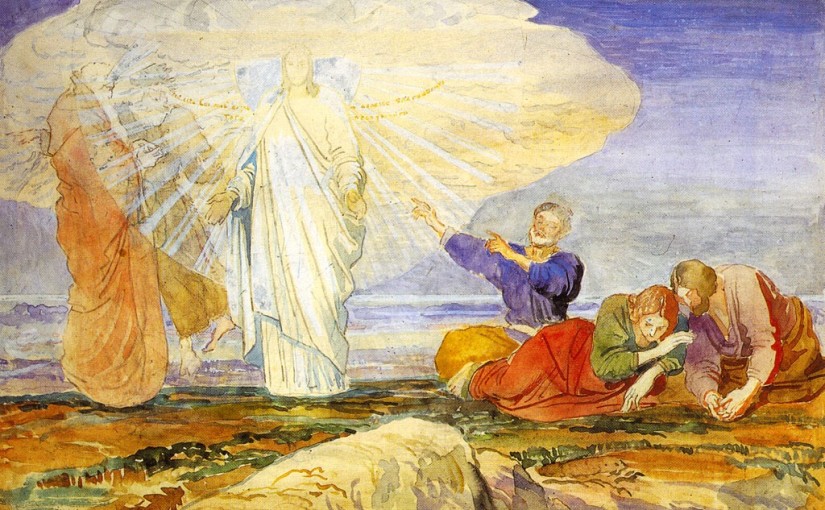Today’s readings
You know, that last line of today’s Gospel reading always gets me thinking, “well what did they think ‘rising from the dead’ meant?” Of course that’s easy for us to say, with the eyes of people who have some idea of how the story ends; but Peter, James and John didn’t have that vision quite yet. When you think about it, up to this point, they’ve been basking in the glory of Jesus’ fame. They are caught up in the whirlwind. They too have been excited to see what Jesus will do next: what miracles he will work, what healings he will affect, what wonderful words he will speak. They have been caught up in the excitement of the crowds who have been following Jesus, at times not understanding things any better than anybody else. Until now.
The Transfiguration is kind of a defining moment for Jesus and his closest disciples. They see Jesus and with him Elijah and Moses … symbols of the Law and the prophets. This gives them a little light, a glimpse of the real Jesus, an insight into who he was that they didn’t have before. And, honestly, it’s a pretty unsettling glimpse. Things had just gotten started and were going well. They weren’t ready to talk about how it was going to end. Jesus had just started speaking to them about his passion and death, and they weren’t ready to hear it. Peter famously stumbles over the idea of Jesus having to die, to which Jesus replies, “Get behind me, Satan. You are thinking not as God does, but as human beings do.”
And now here they are, on the mountain, and they get to see how things were going to be after Jesus’ death and resurrection, only they weren’t ready to see that just yet. But just because they’re not ready for Jesus to die doesn’t mean it’s not going to happen, sooner rather than later. The Gospel story is at a turning point now. God is revealing to Jesus’ closest followers the exact nature of Jesus’ mission in the world. He hasn’t come just to work miracles, say wonderful things, and make people feel good about themselves. We still have that misconception today, if we’re honest about it. No, he hasn’t come to go with the flow and not make waves: he has come to turn the world upside down and make of it the place that it was always supposed to be.
And the way that would happen is by his passion and death … there is no getting around that. As difficult as that may be for his closest friends to hear, they have to hear it and come to terms with it. This experience of the Transfiguration was supposed to give them hope that Jesus’ passion and death wasn’t going to be the end, that God still had wonderful things in store for Jesus, for them, and for the world.
So this is where that first reading comes in. Abraham and Sarah, as you might remember, were childless until God intervened in their lives at a very old age. Finally, they receive Isaac, a real gift from God, a sign that the promise that God made to Abraham – that he would be the father of many nations – would be fulfilled. And now, God asks him, – no, tells him – “Take your son Isaac, your only one, whom you love, and go to the land of Moriah. There you shall offer him up as a holocaust on a height that I will point out to you.” So now Abraham has to weigh his trust in God’s promises against the loss of his only beloved son. And we heard how the story ended, God did not allow Abraham to harm Isaac, but instead provided a lamb for the sacrifice himself.
There is a whole part of this story that was cut out in the reading we have today. What we miss is the conversation between Abraham and Isaac on the way, which, as you might imagine, is rather poignant. At one point, Isaac asks, “Here are the fire and the wood, but where is the sheep for the holocaust?” I can’t imagine how heartbroken Abraham was in that moment. His answer might have been misdirection, or maybe it was faith: “Son, God himself will provide the sheep for the holocaust.”
And Abraham was absolutely right – God himself will provide the lamb for the sacrifice – the perfect lamb, Jesus Christ. This whole reading is a foreshadowing of Jesus’ death and our salvation. He came to suffer and die for our sins, and that’s significance of today’s Gospel event. The world never looked so bright as it did on that Transfiguration day on top of the mountain. But that’s not the last glimpse of that kind of light. That light was just a tiny sample of the glory of the Resurrection. And the Resurrection was just a sample of the Glory of God’s heavenly kingdom, for which we all yearn with eager anticipation as we muddle through the pains and sorrows of this present life.
This is a chance for us all to see in Christ what Peter, James and John did. It’s a chance to see what Abraham did up on that mountain. God did what he asked Abraham to do – he offered his only Son. To take all our sins away.


You must be logged in to post a comment.